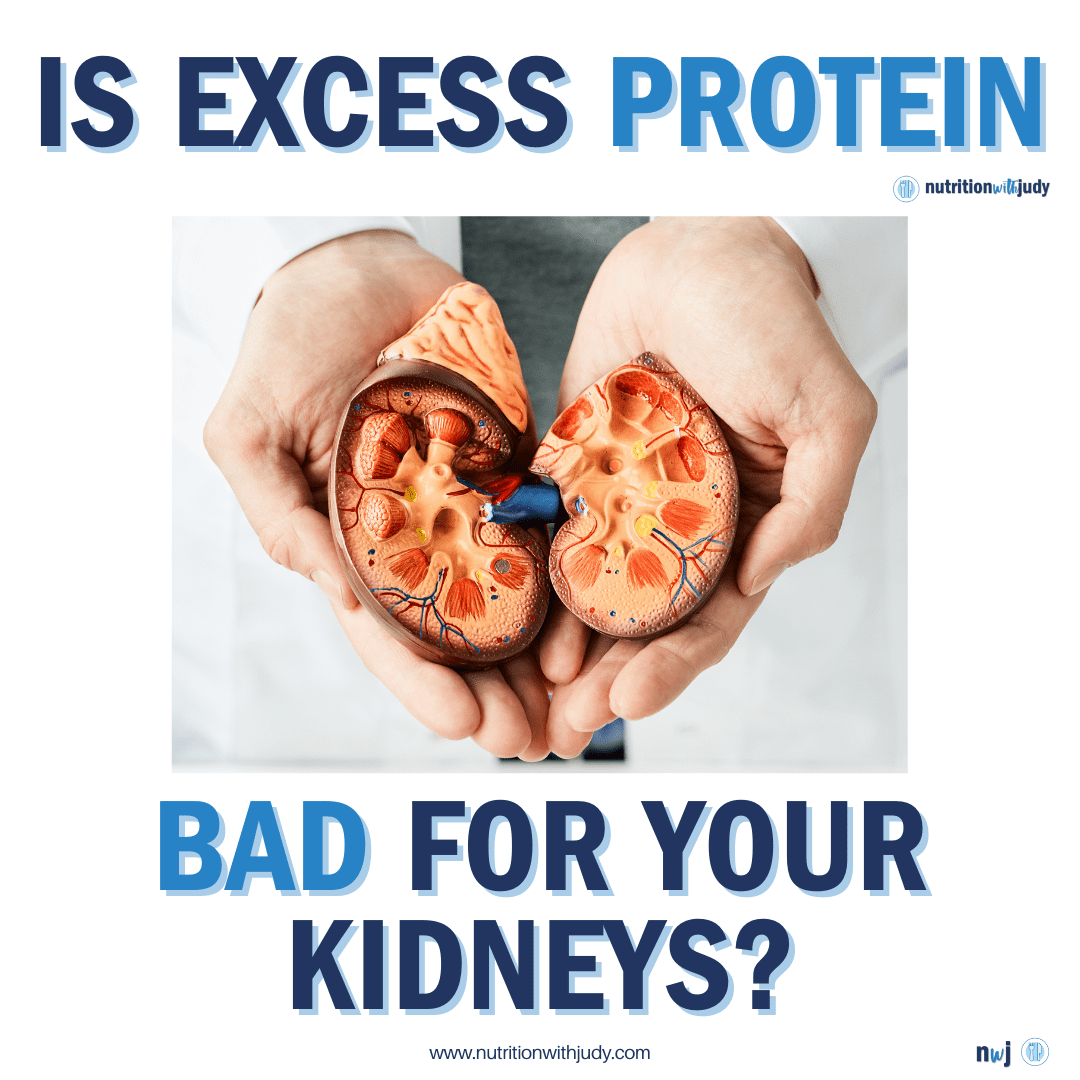

Is a High Protein Diet Bad for Your Kidneys?


Protein is an essential macronutrient and provides the building blocks for life– every cell in our bodies contains protein. The complex group of molecules is responsible for a wide variety of physiological functions ranging from hormone production to muscle repair. While we understand the importance of protein in our diet, is there such a thing as too much protein? This becomes a common concern for individuals starting a carnivore diet and is one of our most frequently asked questions.
For those interested in learning more about the science behind high-protein diets and any potential health risks, this article explores optimal protein consumption, the relationship between protein and kidneys, and the best way to navigate this concern. If you’re wondering if high-protein diets are bad for your kidneys, let’s take a closer look at the science.
What Is Protein?
Protein is characterized by large, complex molecules that serve many essential roles in the body. They’re required for the function, structure, and regulation of the body’s organs and tissues, doing most of the work in cells. Proteins are composed of hundreds or thousands of amino acids that are attached in long chains. There are 20 different forms of amino acids that can be combined in various ways to make a protein. The sequence of amino acids determines each protein’s unique three-dimensional structure and its corresponding specific function. There are a variety of protein functions ranging from Immunoglobulin G (IgG) that serve as antibodies that bind to foreign particles to ferritin that works to bind and carry atoms and small molecules within cells and throughout the body.
Protein and the Body
Protein is a required part of the human diet, providing 20 amino acids in animal protein sources. The body takes the amino acids that are naturally occurring from foods and links them together in long chains. That’s how the body creates all the different proteins it requires to function properly. Nine of these amino acids are referred to as essential since our bodies are incapable of producing them.
Animal sources are ideal for protein for a variety of reasons:
- Better bioavailability: Studies have shown that plant protein is generally of lower quality with reduced bioavailability when compared to animal protein. Plant protein is also less digestible than animal protein.
- Limiting amino acids: Limiting amino acids are essential amino acids found in digested proteins that are in the shortest supply relative to the body’s requirements for absorbed amino acids. That means that when an essential amino acid isn’t provided by plant protein sources, protein synthesis is limited to the rate at which the essential amino acid is available. The body will only make the minimal amount of protein based on the lowest limiting amino acid which is a common concern for those consuming protein primarily from non-animal sources.
- Complete proteins: Animal proteins such as meat, eggs, and dairy are complete proteins, meaning they offer all the essential amino acids required by the body. They also have exclusive nutrients not found in the plant kingdom and are a source of healthy fat and cholesterol required for everything ranging from brain to hormone function.
How Much Protein Do You Need Every Day?
The Recommended Daily Allowance (RDA) for protein for the average sedentary adult is 0.36 grams per pound of body weight. The RDA serves as the minimal amount needed for basic nutrient requirements to avoid deficiency. Protein requirements differ based on gender, age, lifestyle, and other various factors. Things like pregnancy, exercise, and older age can all require a higher protein intake.
Protein Requirements for the Carnivore Diet
The carnivore diet is only comprised of animal foods, prevents carbohydrate intake, and focuses solely on protein and fat. We recommend starting with 0.8 to 1 gram of protein per pound of your desired body weight with 75% of total calories in fat. Everyone is bio-individual so finding the right protein-to-fat ratio will need some experimentation. Generally, many people do well with more of a ketogenic carnivore diet with higher fat. However, some people can’t tolerate high fat due to underlying conditions such as CIRS and require gut healing which leads to higher protein diets. High-protein carnivore diets have also been utilized short-term for certain individuals interested in weight loss.
Are High Protein Diets Safe?
While not all carnivore diets are considered high protein, this is often one of the concerns brought up by individuals interested in trying this way of eating. There has been a widespread misconception that higher protein diets can adversely impact kidney function– dietary protein restrictions have been recommended for patients with chronic kidney disease for a long time now. However, the existing evidence doesn’t actually support these claims. As conventional science is slowly changing on sodium and red meat, it’s time to reexamine the safety of high-protein diets.
Does High-Protein Intake Cause Kidney Disease?
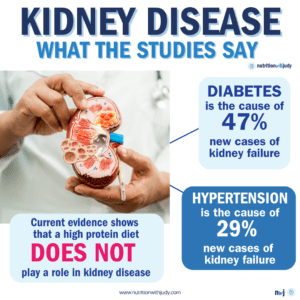

According to the American Kidney Fund, diabetes is the major cause of kidney failure and is responsible for 47% of new cases. Hypertension is the next most common cause, resulting in 29% of new cases. That means that these two drivers cover 76% of all cases of kidney failure. One study reported over 15 different risk factors linked to chronic kidney disease (CKD) and did not include high-protein intake as one of them. More and more studies are showcasing that there isn’t any correlation between how much protein we eat and developing or worsening kidney disease in healthy people. The current evidence shows that dietary protein doesn’t play any role in kidney disease.
For those who already have kidney disease, there isn’t enough evidence supporting the requirement of limited protein intake. A study on chronic renal failure discovered that a low-protein diet only delayed the progression of kidney failure in patients with primary glomerular disease and that were only male. The low-protein diet approach didn’t benefit female patients in this study. Primary glomerular disease only accounts for a small percentage of kidney disease, meaning this approach would only benefit a few people. Studies including the 2020 Cochrane systematic review and the 2022 Kidney360 review also support the existing data that low-protein diets and dietary protein restriction for kidney disease are likely unwarranted.
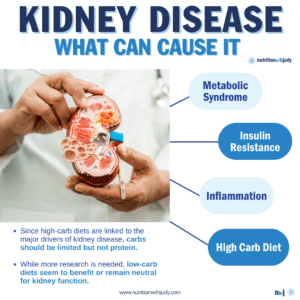

Even studies that suggest protein restriction for kidney disease emphasize that there may be a modest benefit for slowing kidney function decline—however, the results are underwhelming and don’t have the statistical importance to recommend low-protein diets for all kidney disease patients. Since type 2 diabetes and high blood pressure are the main drivers of kidney disease, it would make more sense logically for patients to limit carbohydrates and sugar rather than protein. Those adopting a low-carb or ketogenic diet such as the carnivore diet generally stop or reduce their diabetes and blood pressure medications. While more research is needed, low-carb diets seem to benefit or remain neutral for kidney function. Multiple low-carb diet studies like this one and this one have reported these potential benefits.
Another caveat is that the protein intake ranges used for these studies consider 0.36 grams of protein per pound of body weight as high, even though this is the minimal recommended amount to avoid deficiency. Evidence suggests that higher protein intake is likely needed for optimal health.
For individuals who have stage four CKD or are male with primary glomerular disease, limiting protein may be beneficial in these specific cases. Slowing down protein consumption for these individuals may be ideal since the kidneys can’t filter the breakdown products and enzymes. Otherwise, high protein intake shouldn’t be a concern for most.
Is High-Protein Intake Safe On a Carnivore Diet?
High-protein carnivore diets can be beneficial in certain scenarios but aren’t recommended long-term. Since the diet is comprised solely of protein and fat, eating too lean can adversely impact the body and even lead to protein poisoning. Protein poisoning, also referred to as “rabbit starvation” or “mal de caribou”, is when you opt for only lean meats leading to malnutrition from the lack of fat needed. Some individuals play around with short-term high-protein carnivore diets for weight loss but this isn’t ideal for the body long-term.
A higher fat, moderate protein carnivore diet is ideal long-term. The definitions of moderate and high are often very individualized, but we typically consider moderate protein as 0.8 grams to 1 gram of protein per 1 lb of ideal body weight. The key is sufficient fat for long-term adherence to a Carnivore diet which we consider at least 70% fat in terms of total calories.
Blood Markers for Kidney Function
When individuals consume a high-protein diet, various blood markers may be altered but these changes have been determined to be physiological instead of pathological. That means that while the biomarkers may change due to high protein intake, the numbers don’t signify any risk or development of health concerns. While some biomarkers being imbalanced isn’t a cause for immediate concern, a closer analysis in the context of a carnivore diet is required if all kidney markers are imbalanced. If you’re interested in having blood work drawn to examine your kidney function, it’s important to work with a trusted practitioner for a reliable interpretation.
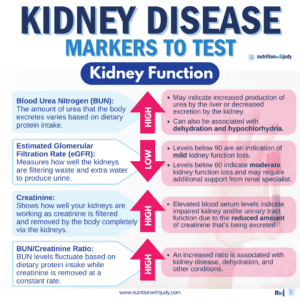

Here are the basic markers to consider for kidney function:
- Blood Urea Nitrogen (BUN): The blood marker tests the amount of urea nitrogen in your blood which is essentially a waste product after the body breaks down proteins needed for the body’s cells. The BUN reflects the ratio between the production and clearance of urea in the body. The amount of urea that the body excretes varies based on dietary protein intake. An elevated BUN may indicate increased urea production by the liver or decreased excretion by the kidney. Elevated BUN has also been associated with dehydration and hypochlorhydria. A lower BUN is associated with malabsorption and low dietary protein intake. This marker is predominantly measured for kidney function.
- Estimated Glomerular Filtration Rate (eGFR): eGFR measures how well the kidneys are filtering waste and extra water to produce urine. It uses four variables, gender, age, race, and creatinine levels, to estimate kidney function. Levels below 90 are an indication of mild kidney function loss. Levels below 60 indicate moderate kidney function loss and may require additional support from a renal specialist for further evaluation.
- Creatinine: Creatine is a chemical the body produces for supplying energy to muscles– creatinine is the chemical waste product of creatine. This blood marker shows how well your kidneys are working as creatinine is filtered and removed by the body completely via the kidneys. Any impaired kidney and/or urinary tract function will reduce the amount of creatinine that’s excreted, leading to elevated blood serum levels. Creatinine is traditionally used with BUN to assess for impaired kidney function.
- BUN/Creatinine Ratio: BUN levels fluctuate based on dietary protein intake while creatinine is removed at a constant rate– that’s why the BUN/creatinine ratio can be used to check for kidney function, dehydration, gut bleeding, and other problems. The normal range is anywhere between 5-20 mg/dL. An increased ratio is associated with kidney disease, dehydration, and other conditions. A lower ratio can indicate low protein intake, kidney dysfunction, advanced liver disease, and other conditions.
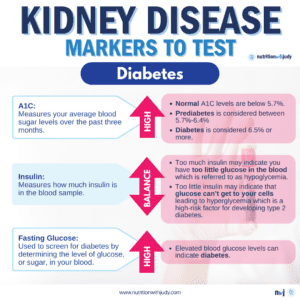

Since most kidney disease is related to metabolic syndrome, insulin resistance, and inflammation, we recommend testing for diabetic markers as well:
- A1C: Also known as the hemoglobin A1C or HbA1c test, A1C measures your average blood sugar levels over the past three months. Normal A1C levels are below 5.7%, prediabetes is considered between 5.7%-6.4%, and diabetes is considered 6.5% or more.
- Insulin: An insulin blood test measures how much insulin is in the blood sample. Insulin is a hormone required to move blood glucose, or blood sugar, from the bloodstream to the cells where it’s used for energy. Too much insulin may indicate you have too little glucose in the blood which is referred to as hypoglycemia. Too little insulin may indicate that glucose can’t get to your cells leading to hyperglycemia which is a high-risk factor for developing type 2 diabetes.
- Fasting glucose: The fasting glucose test is often used to screen for diabetes by determining the level of glucose, or sugar, in your blood. The blood is drawn after the patient has fasted for 10 hours before the test. Elevated blood glucose levels can indicate diabetes.
Closing Thoughts On High-Protein Intake
Unless you have stage 4 CKD or are male with primary glomerular disease, protein shouldn’t be restricted in the diet. For those on a carnivore diet, make sure you’re getting enough fat to avoid rabbit starvation. Otherwise, evidence supports that low-carb diets are very beneficial even for those with kidney disease. Checking both basic kidney function and diabetic markers can help provide more insight if you’re concerned with developing kidney disease or dysfunction. For optimal kidney function and overall health, make sure to hydrate with at least half your body weight in ounces. Learn more about our tips for proper hydration here.
Work With Our Trusted Carnivore Diet Functional Nutritional Therapy Practitioners
The Nutrition with Judy practice is honored to be a trusted carnivore diet practitioner support serving clients from around the globe. We’re passionate about helping our clients achieve root-cause healing in order to lead the best quality of life possible that’s nearly symptom-free. Our team is dedicated to educating our community about the incredible benefits of the carnivore diet. We welcome you to explore our free resources and are always available to support you through personalized protocols. Our Symptom Burden Assessment (SBA) is the perfect starting point for discovering your root cause and is required to work with our team— you can learn more in-depth about this powerful tool here.
Start your root-cause healing journey today and contact us any time with any questions or concerns.
DISCLAIMER: This content is for educational purposes only. While we are board-certified in holistic nutrition and are nutritional therapy practitioners, we are not providing medical advice. Whenever you start a new diet or protocol, always consult with your trusted practitioner first.





